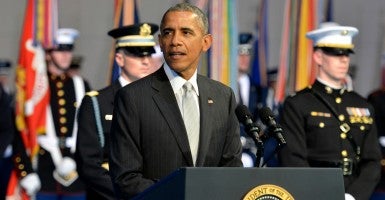A “tiger mom” might go ballistic if her child came home with a “needs improvement” on his kindergarten report card. But most adults wouldn’t panic. They know there is time to get the kid up to standard before the deadline for that Harvard application falls due.
Defending America is different. A sub-par grade for military preparedness ought to be an immediate concern.
Today, despite our multibillion-dollar investment, America’s military is not all that great. That was the finding of a two-year research effort by a team of analysts at The Heritage Foundation.
“The Index of U.S. Military Strength” grades the armed forces. The ranking this year? Marginal.
Heritage is not alone. Every single service chief issued a similar warning this spring, when testifying at the annual readiness hearing before Congress.
For example, Army Chief of Staff Gen. Raymond T. Odierno declared the “Army cannot fulfill its role in the defense strategy” if all cuts required under the Budget Control Act of 2011 are fully implemented.
The other services raise red flags, as well. The Marine Corps, for instance, is running about two-thirds the number of battalions it has historically needed to meet day-to-day operational demands.
Indeed, by the time President Barack Obama leaves office, every branch of the U.S. military will be smaller than it was on 9/11.
Does that make sense? Is the world safer for America today than it was on Sept. 10, 2001?
When the U.S. military lacks the capacity and capabilities to protect all its vital interests, the country is worse off. It is just that simple.
Few dispute that today’s U.S. military is comparatively smaller and less capable to handle the missions assigned to the Pentagon—especially given the variety of active adversaries and competitors. But some argue that this is no big deal.
After all, they say, nobody really wants to fight World War III with the United States.
That’s probably right. But this rejoinder misses the point. Moscow, Tehran and Beijing don’t want to get into a fighting war with the United States.
Even al-Qaida and the Islamic State don’t really want to mess with us. They would actually prefer that the U.S. not repeat the large-scale military interventions mounted against them during the Bush administration.
Yes, everyone would prefer to win without fighting. Sadly, diminishing American military might plays directly into our opponents’ preferences as well as their strategy.
Potential adversaries can add. As U.S. relative power declines, the Pentagon becomes increasingly unable to deal with more than one problem at a time. They know, for example, that if Washington becomes absorbed in a Middle East crisis, it will have less capacity and appetite to intervene elsewhere.
If the U.S. lacks the means to win, then an enemy’s answer is a lot easier: Just demonstrate the ability to make sure America knows wars will be messy. That will convince Washington the best course is to just back off.
As problems grow and the Pentagon loses more capacity to deal with them, decision makers in the U.S. will become increasingly risk-averse.
Adversaries will exploit America’s indecision and reluctance to engage.
This administration has tried to make up for shaving military power by adding a double dose of diplomacy. Their efforts have demonstrated that hard and soft power are not interchangeable.
Adding a diplomatic initiative is no substitute for dumping a division. The Russian reset, for insistence, didn’t deter Russian adventurism in Europe.
Deliberate self-weakening in the face of an aggressive adversary invites aggression. Military and diplomacy work better when they wisely complement each other.
Washington doesn’t need more war-mongering. But it does need a responsibly sized and capable military—one that realistically matches the needs of a global power with global interests. Pairing the right armed forces with the right foreign policy is the best answer.
Originally distributed through McClatchy-Tribune






























